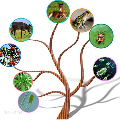With recent advances in Generative AI, it is becoming easier to automatically manipulate 3D models. However, current methods tend to apply edits to models globally, which risks compromising the intended functionality of the 3D model when fabricated in the physical world. For example, modifying functional segments in 3D models, such as the base of a vase, could break the original functionality of the model, thus causing the vase to fall over. We introduce a method for automatically segmenting 3D models into functional and aesthetic elements. This method allows users to selectively modify aesthetic segments of 3D models, without affecting the functional segments. To develop this method we first create a taxonomy of functionality in 3D models by qualitatively analyzing 1000 models sourced from a popular 3D printing repository, Thingiverse. With this taxonomy, we develop a semi-automatic classification method to decompose 3D models into functional and aesthetic elements. We propose a system called Style2Fab that allows users to selectively stylize 3D models without compromising their functionality. We evaluate the effectiveness of our classification method compared to human-annotated data, and demonstrate the utility of Style2Fab with a user study to show that functionality-aware segmentation helps preserve model functionality.
翻译:暂无翻译





